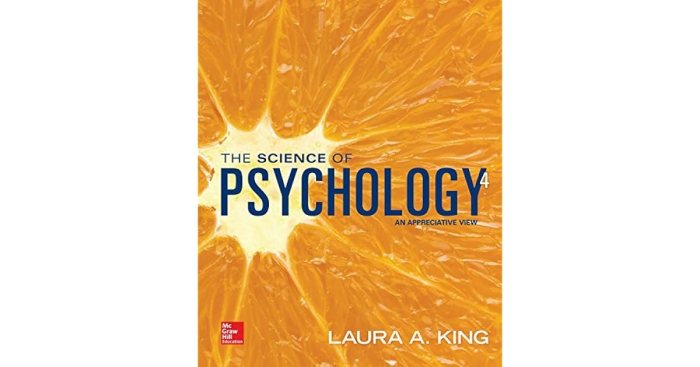The science of psychology: an appreciative view 6th edition free – The Science of Psychology: An Appreciative View, 6th Edition, embarks on a captivating journey into the intricate world of human behavior and mental processes. This comprehensive guide unravels the complexities of psychology, tracing its historical roots, exploring its diverse research methods, and delving into the biological, cognitive, developmental, social, clinical, and applied aspects of this fascinating field.
Through engaging prose and insightful examples, this text illuminates the profound impact psychology has on our understanding of ourselves, our relationships, and the world around us. It challenges conventional wisdom, fosters critical thinking, and inspires a deeper appreciation for the scientific underpinnings of human behavior.
1. Introduction
This book provides a comprehensive overview of the science of psychology. It defines the scope of psychology and discusses its importance as a scientific discipline. The book also traces the history of psychology from its philosophical roots to its emergence as a modern science.
Objectives of the Book
- To provide a comprehensive overview of the science of psychology.
- To discuss the importance of psychology as a scientific discipline.
- To trace the history of psychology from its philosophical roots to its emergence as a modern science.
2. History of Psychology
The history of psychology can be traced back to the ancient Greeks, who were the first to study the mind and behavior in a systematic way. However, it was not until the 19th century that psychology emerged as a modern science.
The development of psychology as a science was largely due to the work of Wilhelm Wundt, who founded the first psychology laboratory in 1879.
Contributions of Key Figures in the History of Psychology
- Wilhelm Wundt: Founded the first psychology laboratory in 1879.
- William James: Developed the theory of functionalism.
- Sigmund Freud: Developed the theory of psychoanalysis.
- B.F. Skinner: Developed the theory of behaviorism.
- Carl Rogers: Developed the theory of humanistic psychology.
3. Research Methods in Psychology
Research methods in psychology are used to collect data about human behavior. There are a variety of research methods that can be used, including experiments, surveys, and naturalistic observation. The choice of research method depends on the specific research question being asked.
Strengths and Weaknesses of Different Research Methods
- Experiments:Experiments are the most controlled research method, but they can be difficult to conduct and may not always be generalizable to real-world settings.
- Surveys:Surveys are a relatively easy and inexpensive way to collect data from a large number of people, but they can be subject to bias.
- Naturalistic observation:Naturalistic observation involves observing people in their natural environment, but it can be difficult to control for confounding variables.
4. Biological Bases of Behavior: The Science Of Psychology: An Appreciative View 6th Edition Free

The biological bases of behavior refer to the role of the brain and nervous system in behavior. The brain is the control center of the body, and it is responsible for a wide range of functions, including thought, emotion, and movement.
The nervous system is a network of cells that transmit messages throughout the body.
Influence of Genetics and Evolution on Behavior, The science of psychology: an appreciative view 6th edition free
- Genetics:Genes play a role in a variety of behaviors, including intelligence, personality, and mental illness.
- Evolution:Evolution has shaped human behavior in a number of ways, including by giving us a capacity for language and cooperation.
User Queries
What is the primary focus of The Science of Psychology: An Appreciative View, 6th Edition?
This text provides a comprehensive overview of the field of psychology, exploring its history, research methods, and major subfields, including biological, cognitive, developmental, social, clinical, and applied psychology.
How does this book differ from other psychology textbooks?
The Science of Psychology: An Appreciative View, 6th Edition, distinguishes itself through its engaging writing style, thought-provoking examples, and emphasis on the scientific underpinnings of psychology. It fosters critical thinking and encourages readers to develop a deeper understanding of human behavior.
What are the key benefits of reading this book?
Readers will gain a comprehensive understanding of psychology, its history, methods, and major subfields. They will develop critical thinking skills, appreciate the scientific basis of psychology, and gain insights into the complexities of human behavior and mental processes.
